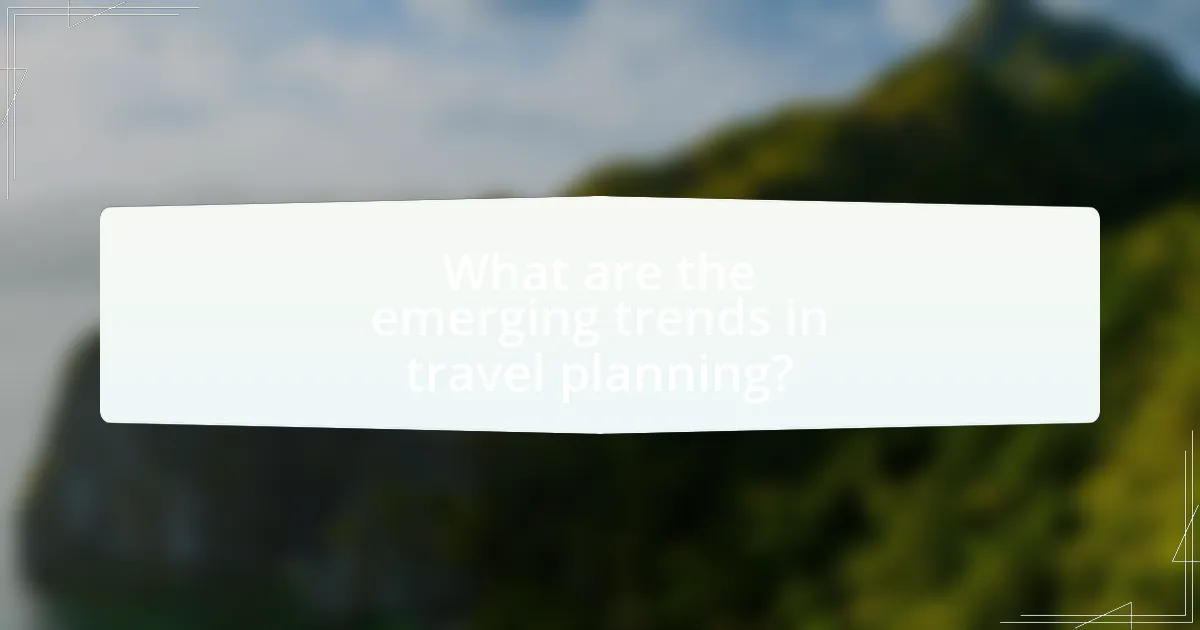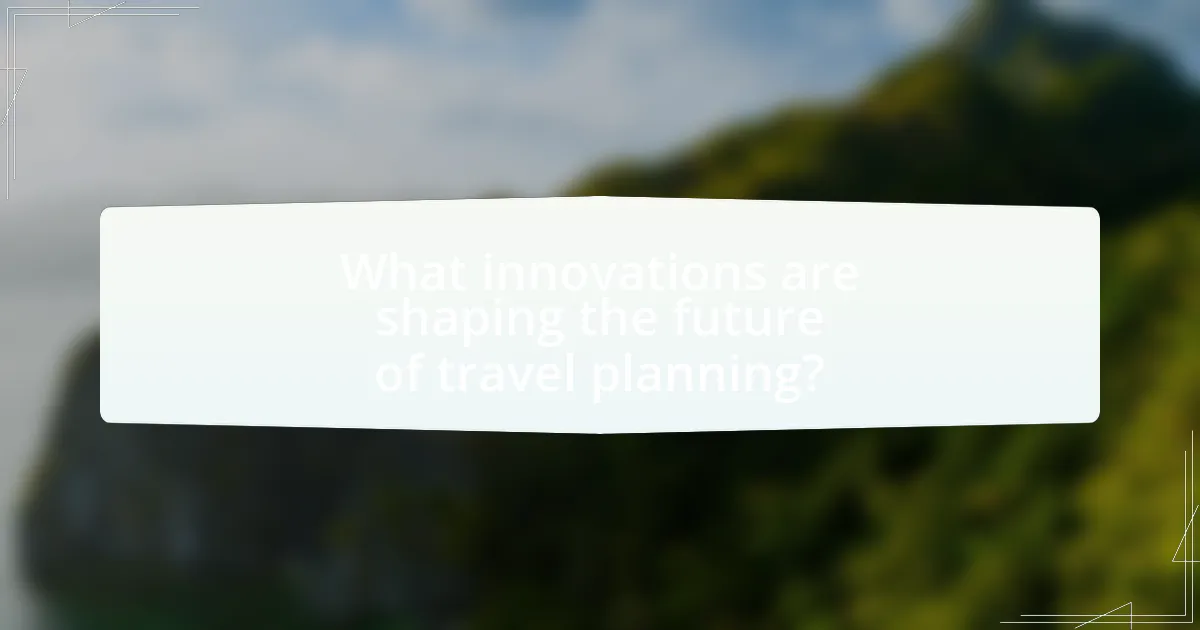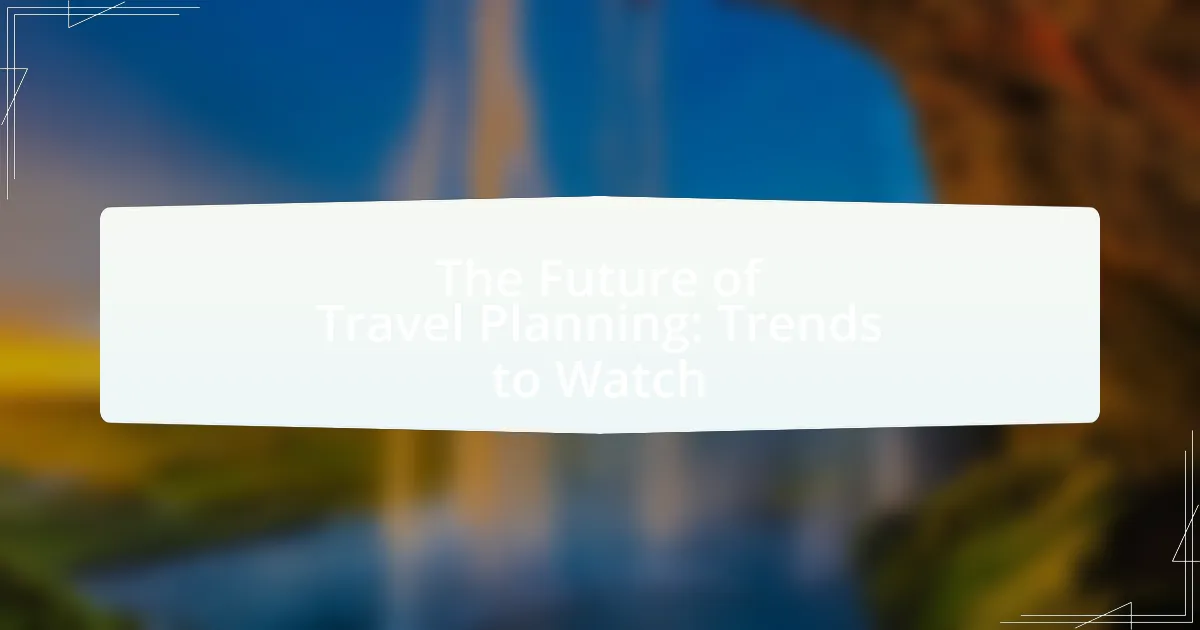The article “The Future of Travel Planning: Trends to Watch” examines emerging trends that are reshaping the travel planning landscape, including increased personalization, the integration of artificial intelligence, and a growing emphasis on sustainability. It highlights how technology, particularly mobile applications and AI-driven tools, enhances user experiences by providing tailored recommendations and streamlining booking processes. Additionally, the article discusses the impact of consumer behavior shifts towards eco-friendly options and personalized travel experiences, as well as the challenges posed by economic factors and privacy concerns in the travel industry. Innovations such as virtual and augmented reality are also explored for their role in enhancing travel decision-making and experiences.

What are the emerging trends in travel planning?
Emerging trends in travel planning include increased personalization, the use of artificial intelligence, and a focus on sustainability. Personalization is driven by data analytics, allowing travel companies to tailor experiences based on individual preferences, as evidenced by a 2022 study from McKinsey, which found that 71% of consumers expect personalized interactions. Artificial intelligence enhances efficiency in booking processes and customer service, with tools like chatbots becoming commonplace. Additionally, sustainability is gaining traction, with 83% of travelers indicating a preference for eco-friendly options, according to a 2023 report by Booking.com. These trends reflect a shift towards more customized, efficient, and environmentally conscious travel experiences.
How is technology reshaping travel planning?
Technology is reshaping travel planning by enabling personalized experiences through data analytics and artificial intelligence. Travel platforms now utilize algorithms to analyze user preferences, past behaviors, and real-time data, allowing for tailored recommendations on destinations, accommodations, and activities. For instance, according to a report by Phocuswright, 70% of travelers express a preference for personalized travel recommendations, highlighting the demand for technology-driven customization. Additionally, mobile applications and online booking systems streamline the planning process, making it more efficient and accessible. The integration of virtual reality in travel planning also allows users to explore destinations before booking, further enhancing decision-making.
What role do mobile apps play in modern travel planning?
Mobile apps are essential tools in modern travel planning, streamlining the process of booking, organizing, and managing travel itineraries. They provide users with instant access to a wide range of services, including flight and hotel bookings, transportation options, and local attractions, all from a single platform. According to a report by Statista, as of 2023, over 70% of travelers utilize mobile apps for travel-related tasks, highlighting their significance in enhancing user convenience and efficiency. Additionally, features such as real-time notifications, personalized recommendations, and user-generated reviews further empower travelers to make informed decisions, thereby transforming the travel planning experience.
How are AI and machine learning influencing travel recommendations?
AI and machine learning are significantly influencing travel recommendations by personalizing suggestions based on user preferences and behaviors. These technologies analyze vast amounts of data, including past travel history, search patterns, and social media activity, to create tailored recommendations that enhance user experience. For instance, platforms like Expedia and Airbnb utilize machine learning algorithms to predict user preferences, resulting in more relevant hotel and activity suggestions. Research indicates that personalized recommendations can increase user engagement by up to 50%, demonstrating the effectiveness of AI-driven insights in the travel industry.
What changes are occurring in consumer behavior regarding travel?
Consumer behavior regarding travel is shifting towards increased demand for personalized experiences and sustainable options. Travelers are increasingly seeking unique, tailored itineraries that reflect their individual preferences, as evidenced by a 2022 survey from Booking.com, which found that 70% of respondents expressed a desire for more personalized travel experiences. Additionally, there is a growing emphasis on sustainability, with 61% of travelers indicating they are more likely to choose eco-friendly accommodations and activities, according to a 2023 report by the World Travel & Tourism Council. This trend highlights a significant change in consumer priorities, focusing on both personalization and environmental responsibility in travel choices.
Why are travelers seeking personalized experiences?
Travelers are seeking personalized experiences to enhance their satisfaction and engagement during trips. This demand arises from a desire for unique, tailored adventures that reflect individual preferences and interests, rather than generic travel packages. Research indicates that 70% of travelers prefer experiences that are customized to their specific desires, highlighting a significant shift towards personalization in the travel industry. This trend is driven by advancements in technology, such as data analytics and artificial intelligence, which enable travel companies to offer bespoke services that cater to the unique needs of each traveler.
How is sustainability impacting travel planning decisions?
Sustainability is significantly influencing travel planning decisions by prioritizing eco-friendly options and responsible tourism practices. Travelers increasingly seek accommodations, transportation, and activities that minimize environmental impact, reflecting a growing awareness of climate change and resource conservation. For instance, a 2021 survey by Booking.com revealed that 81% of global travelers feel strongly that companies should help reduce their carbon footprint, indicating a clear demand for sustainable travel choices. This shift is prompting travel companies to adopt greener practices, such as offering carbon offset programs and promoting local experiences that support community economies.

What innovations are shaping the future of travel planning?
Innovations shaping the future of travel planning include artificial intelligence, personalized travel experiences, and blockchain technology. Artificial intelligence enhances travel planning by providing tailored recommendations based on user preferences and past behaviors, significantly improving customer satisfaction. Personalized travel experiences are facilitated through data analytics, allowing companies to create unique itineraries that cater to individual needs, which has been shown to increase engagement and loyalty among travelers. Blockchain technology is revolutionizing the industry by ensuring secure transactions and transparent supply chains, which enhances trust and reduces fraud in travel bookings. These innovations collectively streamline the travel planning process, making it more efficient and user-friendly.
How are virtual and augmented reality changing the travel experience?
Virtual and augmented reality are transforming the travel experience by providing immersive previews of destinations and enhancing real-time interactions during travel. These technologies allow users to explore locations virtually before visiting, which can influence their travel decisions; for instance, a study by the World Travel & Tourism Council found that 67% of travelers are more likely to visit a destination after experiencing it through virtual reality. Additionally, augmented reality applications enhance on-site experiences by overlaying digital information onto the physical world, such as providing historical context or navigation assistance, thereby enriching the travel experience and making it more engaging.
What are the benefits of using VR for travel previews?
Using VR for travel previews enhances the planning experience by providing immersive, realistic simulations of destinations. This technology allows potential travelers to explore locations virtually, helping them make informed decisions about their trips. Studies indicate that 70% of users feel more confident in their travel choices after experiencing VR previews, as they can visualize accommodations, attractions, and environments before booking. Additionally, VR can reduce the uncertainty associated with travel planning, leading to higher satisfaction rates among travelers.
How does AR enhance the travel planning process?
Augmented Reality (AR) enhances the travel planning process by providing immersive experiences that allow users to visualize destinations and accommodations before making decisions. For instance, AR applications enable travelers to overlay digital information onto real-world environments, helping them explore landmarks, read reviews, and view 3D models of hotels. A study by the International Journal of Information Management found that 70% of users reported increased confidence in their travel choices when using AR tools, demonstrating its effectiveness in improving decision-making.
What new platforms are emerging for travel planning?
New platforms emerging for travel planning include AI-driven tools like Hopper and travel planning apps such as TripIt and Roadtrippers. Hopper utilizes predictive analytics to forecast flight prices, helping users book at the optimal time, while TripIt organizes travel itineraries in one place, enhancing user convenience. Roadtrippers focuses on road travel, allowing users to plan routes and discover attractions along the way. These platforms reflect a trend towards personalization and efficiency in travel planning, catering to the evolving needs of modern travelers.
How do social media platforms influence travel choices?
Social media platforms significantly influence travel choices by shaping perceptions and providing information about destinations. Users often rely on visual content, such as photos and videos shared by friends or influencers, which can create a desire to visit specific locations. According to a study by Expedia, 75% of travelers are influenced by social media when deciding on their travel destinations. Additionally, platforms like Instagram and Pinterest serve as sources of inspiration, showcasing unique experiences and hidden gems that may not be found in traditional travel guides. This visual and social validation can lead to increased interest and bookings for particular destinations.
What are the advantages of using collaborative travel planning tools?
Collaborative travel planning tools enhance the travel planning experience by allowing multiple users to contribute ideas and preferences in real-time. These tools facilitate better communication among group members, ensuring that everyone’s preferences are considered, which leads to more personalized and satisfying travel itineraries. Additionally, they streamline the decision-making process by providing a centralized platform for sharing information, such as accommodation options, activities, and budgets. Research indicates that 70% of travelers prefer collaborative planning methods, as it fosters a sense of shared ownership and excitement about the trip.

What challenges are faced in the future of travel planning?
The future of travel planning faces several challenges, including the impact of climate change, evolving consumer preferences, and technological disruptions. Climate change poses a significant threat, as it affects travel destinations, increases natural disasters, and leads to stricter regulations on carbon emissions. Evolving consumer preferences, particularly post-pandemic, demand more personalized and sustainable travel options, complicating traditional planning methods. Additionally, technological disruptions, such as the rise of artificial intelligence and automation, require travel planners to adapt quickly to new tools and platforms, which can be resource-intensive. These challenges necessitate innovative solutions and adaptability within the travel industry to meet changing demands and environmental considerations.
How do economic factors affect travel planning trends?
Economic factors significantly influence travel planning trends by affecting consumer spending power and travel preferences. For instance, during economic downturns, travelers tend to prioritize budget-friendly options, leading to increased demand for affordable accommodations and local experiences. According to a 2022 report by the World Travel & Tourism Council, a 10% increase in unemployment correlates with a 15% decline in international travel bookings. Conversely, in periods of economic growth, consumers are more likely to spend on luxury travel and long-haul destinations, as evidenced by a 20% rise in premium travel bookings during the economic recovery post-2021. Thus, economic conditions directly shape the choices and behaviors of travelers, impacting the overall travel market dynamics.
What impact does inflation have on travel budgets?
Inflation significantly reduces travel budgets by increasing the costs of transportation, accommodation, and activities. For instance, as of 2023, the U.S. inflation rate reached approximately 3.7%, leading to higher prices for airline tickets and hotel stays, which can rise by 10% or more compared to previous years. This means travelers may need to allocate more funds for the same experiences, ultimately limiting their travel options or forcing them to cut back on expenses.
How do geopolitical issues influence travel decisions?
Geopolitical issues significantly influence travel decisions by affecting safety perceptions, travel restrictions, and economic conditions. For instance, travelers often avoid regions experiencing political instability, such as countries with ongoing conflicts or civil unrest, as evidenced by a 2022 survey from the Global Business Travel Association, which indicated that 70% of business travelers consider safety a top priority when choosing destinations. Additionally, government advisories and travel bans can restrict access to certain areas, further shaping travel choices. Economic sanctions or trade disputes can also impact travel costs and availability of services, leading travelers to reconsider their plans.
What are the privacy concerns related to travel planning technologies?
Travel planning technologies raise significant privacy concerns primarily due to the collection and storage of personal data. These technologies often require users to input sensitive information such as travel itineraries, payment details, and personal identification, which can be vulnerable to data breaches. For instance, a report by the Identity Theft Resource Center indicated that data breaches in various sectors, including travel, increased by 17% in 2020, highlighting the risks associated with storing personal information online. Additionally, the use of tracking cookies and location data by travel apps can lead to unauthorized surveillance and profiling of users, further exacerbating privacy issues.
How can travelers protect their personal information when using travel apps?
Travelers can protect their personal information when using travel apps by implementing strong privacy settings and being cautious about the information they share. Utilizing apps that offer end-to-end encryption and regularly updating privacy settings can significantly reduce the risk of data breaches. According to a 2021 report by the Identity Theft Resource Center, 1,862 data breaches were reported in the U.S., highlighting the importance of safeguarding personal information. Additionally, travelers should avoid using public Wi-Fi for transactions and consider using a virtual private network (VPN) to encrypt their internet connection, further enhancing their security while using travel apps.
What regulations are emerging to safeguard consumer data in travel planning?
Emerging regulations to safeguard consumer data in travel planning include the General Data Protection Regulation (GDPR) in Europe and the California Consumer Privacy Act (CCPA) in the United States. GDPR mandates strict consent requirements for data collection and grants consumers rights over their personal data, while CCPA provides California residents with rights to know, delete, and opt-out of the sale of their personal information. These regulations aim to enhance consumer privacy and security in the travel industry, reflecting a growing global emphasis on data protection.
What practical tips can enhance your travel planning experience?
To enhance your travel planning experience, utilize digital tools such as travel apps and websites that aggregate information on flights, accommodations, and activities. These platforms, like Google Flights and TripAdvisor, provide real-time data, user reviews, and price comparisons, making it easier to make informed decisions. Research indicates that travelers who use technology for planning report higher satisfaction levels, as they can access a wider range of options and streamline their itineraries.
How can you effectively use technology to streamline your travel planning?
You can effectively use technology to streamline your travel planning by utilizing travel apps and online platforms that consolidate information and automate processes. For instance, apps like Google Flights and Skyscanner allow users to compare flight prices in real-time, while platforms such as Airbnb and Booking.com simplify accommodation booking by providing user reviews and instant booking options. Additionally, itinerary management tools like TripIt can organize travel plans in one place, making it easier to access important details. According to a study by the Global Business Travel Association, 70% of travelers prefer using technology for planning and booking travel, highlighting its effectiveness in enhancing the travel planning experience.
What strategies can help you stay informed about travel trends?
To stay informed about travel trends, regularly follow industry news sources, subscribe to travel blogs, and engage with social media platforms focused on travel. Industry news sources like Skift and Travel Weekly provide up-to-date information on market trends and consumer behavior. Travel blogs often share personal experiences and insights into emerging destinations and travel styles. Engaging with social media platforms, such as Instagram and Twitter, allows travelers to see real-time updates and trends from influencers and travel experts. According to a 2022 report by the World Travel & Tourism Council, 70% of travelers rely on social media for travel inspiration, highlighting its effectiveness as a strategy for staying informed.

Leave a Reply